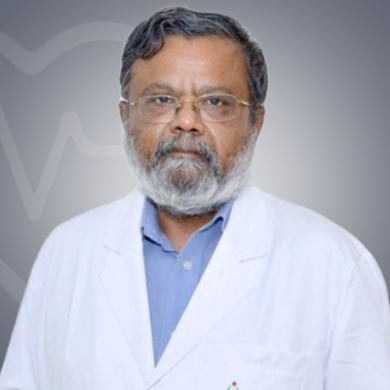
Surgical Oncologist
Fortis Memorial Research Institute , Gurgaon, India34 Years of experience
Speaks: English
Here is the list of some of the conditions Dr Sabyasachi Bal treats:
Some women require surgery to remove the entire breast through mastectomy. The surgeons remove the breast tissues including nipple and the skin and the tissues that have the chest muscles. You may opt for breast reconstruction after a mastectomy.
People may experience both symptoms and signs of cancer, and this shows that something is going abnormal in the body. Also, recognizing these indicators could lead to an earlier diagnosis of the disease and possibly of better treatment. When cancer grows, the organs, nerves, and blood vessels are a little compressed, which can lead to signs and symptoms. Some of the signs and symptoms of different types of cancer are as follows:
You can see Dr Sabyasachi Bal between 11 am and 6 pm from Monday to Saturday. The doctor is not available on Sunday.
The list of popular procedures that Dr Sabyasachi Bal performs for cancer treatment are given below
The doctor has rich experience in performing complex cases with accuracy. The surgeon has performed a large number of procedures with a high success rate and adheres to medical protocols to ensure patient safety and speedy recovery. The specialist is proficient in using the latest techniques to perform the procedures and ensures that the patient has a speedy recovery. A surgical oncologist performs cancer surgery in two ways: minimally invasive surgery and open surgery. Minimally invasive surgery uses techniques that focus on minimizing the trauma of traditional surgery. Some of the minimally invasive techniques are cryosurgery, robotic surgery, laparoscopy, cryosurgery, and laser surgery. In open surgery, surgeons make a single large cut to remove the tumor and some healthy tissues.

Share Your Experience about Dr. Sabyasachi Bal

A surgical oncologist is a general surgeon with training in various procedures for diagnosing or removing cancerous growths. The common procedures performed by a surgical oncologist are biopsy and surgery for the removal of cancerous growth. In some cases, a surgical oncologist performs surgeries to find out parts of the body where cancer has spread. In special cases, the surgeons do preventive surgeries. Sometimes, additional treatments like chemotherapy or radiation follow surgery. In these cases, surgical oncologists play an important role in providing care to the patients post-surgery.
Surgical oncologists may suggest the below-listed tests for the diagnosis of cancer:
In most cases, surgical oncologists need to perform a biopsy in order to diagnose cancer. In this procedure, the doctor removes a part of the body tissues to examine under a microscope. The doctor then does other tests to check if the tissue is cancer.
If your primary doctor suspects cancer, he will refer you to a surgical oncologist for the diagnosis of the condition. The surgical oncologist evaluates the symptoms and analyses the test report to find out if you have cancer. In the below-listed situations, you must seek assistance from a surgical oncologist: